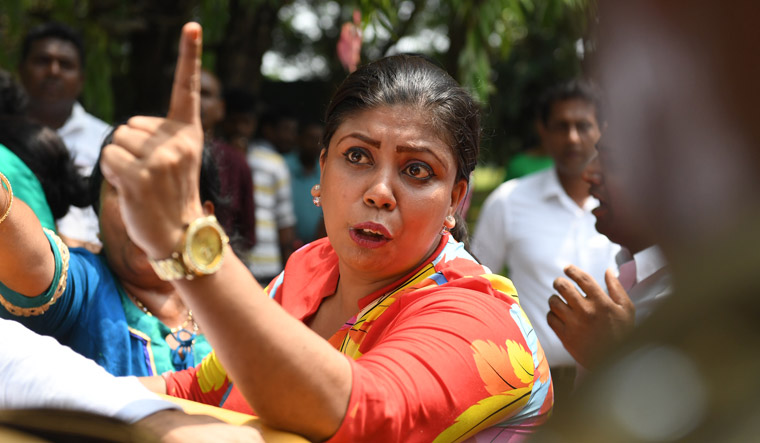Sri Lanka witnessed another political drama inside the 225-member parliament on Wednesday as a majority of the lawmakers in the country voted to remove Mahinda Rajapaksa as prime minister. The high drama in the house made it further unclear as to who the lawful prime minister of the country is as the island nation currently has two PMs—an ousted prime minister and a purported prime minister.
Amid chaos and commotion inside the parliament as the law makers wanted their voices heard, Speaker Karu Jayasuriya announced that the vote of confidence against Rajapaksa has been passed.
While the law makers backing ousted Prime Minister Ranil Wickremesinghe, leader of Tamil National Alliance (TNA) R Sampanthan and leaders of other parties say that Rajapaksa, who was appointed prime minister by President Maithripala Sirisena, lost the motion, Rajapaksa camp has claimed that the vote of confidence was undemocratic. “It is undemocratic. We cannot accept this,” said Namal Rajapaksa, Mahinda's son and MP.
The vote of confidence motion was moved by United National Party (UNP) member Lakshman Kiriella. Sri Lankan parliament witnessed unprecedented scenes as Rajapaksa, flanked by his son, walked out of his chamber. Moments after he left the house, law makers supporting him were seen shouting at the top of their voice, opposing the no confidence motion. Some of the law makers were even seen attempting to grab the mace to disrupt the vote.
Despite the commotion, Speaker Jayasuriya was seen clinging on to the mace and went ahead to pass the vote of confidence motion against Rajapaksa. “I recognise that the government has no majority according to the voice,” he said. In the 225-member house, 122 law makers voted against Rajapaksa, forcing him out of his latest comeback bid. “The speaker cannot go for a voice vote. If the speaker wants to select a prime minister, he can show 113 votes to the president and ask for it,” said Namal Rajapaksa even as Wickremesinghe's UNP claimed that it managed to end the political coup in Sri Lanka. “It is the first victory for the democracy,” said Sajith Premadasa, deputy leader of UNP.
Wickremesinghe tweeted from his Temple Trees residence saying, “We will now ensure that the government in place before October 26 will continue.” Meanwhile, the speaker has reportedly submitted the motion signed by 122 law makers who voted in favour of the no confidence motion against Rajapaksa to President Sirisena.
Also read
- Sri Lanka: Race car rams into spectators; 7 killed, 23 critical
- Sri Lanka: Ex-president Gotabaya Rajapaksa claims 'foreign conspiracy' ousted him in 2022
- 'I may be killed today or tomorrow': Sri Lanka Sports Minister
- Is Velupillai Prabhakaran's daughter Duwaraka alive?
- ICC suspends Sri Lanka Cricket over 'government interference'
However, it is unclear if Wickremesinghe can resume as the prime minister immediately and if he would continue in office. According to sources, now that Rajapaksa has lost the vote of confidence, a new prime minister and his cabinet will have to be sworn in by the president for a smooth functioning of the government. Anura Kumara Dissanayaka, a prominent leader from the Janatha Vimukthi Peramuna, said “Both the prime minister’s seat and the cabinet are empty. The president will have to appoint someone for parliament to approve”.
Amidst all the confusions and chaos, the parliament was adjourned till 10am on Thursday. However, there are fears among the law makers that the assembly could be suspended before the session begins again on Thursday. Sources say the president and the Rajapaksa camp have other plans to make the latter come back to power.
In the meantime, five MPs, including TNA’s Vadivel Suresh who switched camps multiple times, once again crossed over to Wickremesinghe camp. The MPs coming back to support the ousted prime minister and Rajapaksa walking out of the prime minister’s chamber were some of the dramatic scenes to have ever unfolded in the political history of the island nation, deepening the unprecedented political turmoil in Sri Lanka. Touted to be the oldest democracy in the whole of Asia, the scenes inside the Sri Lankan parliament on Wednesday and the political drama played out in the past few weeks piqued the interest of politicians and political observers across the globe.
It may be recalled that President Sirisena surprised the country on October 26 when he replaced Wickremesinghe with Rajapaksa as the prime minister. The Rajapaksa camp, since then, was confident of winning the confidence vote with the support of more than 113 MPs. Several MPs even went ahead to play the crossover bid and were offered ministries. Wickremesinghe, however, refused to vacate the official Temple Trees residence of the prime minister. While constitutional experts called it a political coup and asked if the sacking of Wickremesinghe was valid, the latter demanded that he should be given a chance of prove majority in the parliament. When the president realised that despite the lobbying by both the sides, the Rajapaksa had only a slim chance to prove the majority, he dissolved the parliament on November 9, shocking the world.
The move to dissolve the parliament was stayed by the country's top court following which Speaker Jayasuriya convened the parliament on Wednesday, leading to the vote of confidence against Rajapaksa.
It is worth mentioning that relationship between President Sirisena and Wickremesinghe had soured in the last one year after the president felt he was losing his reputation and that Wickremesinghe was taking decisions without consulting with the former. This, according to sources, prompted President Sirisena to side with Rajapaksa.
President Sirisena’s plan to bring back Rajapaksa was thwarted on Wednesday. But the crisis has deepened, leaving the country with no lawful prime minister in place.



